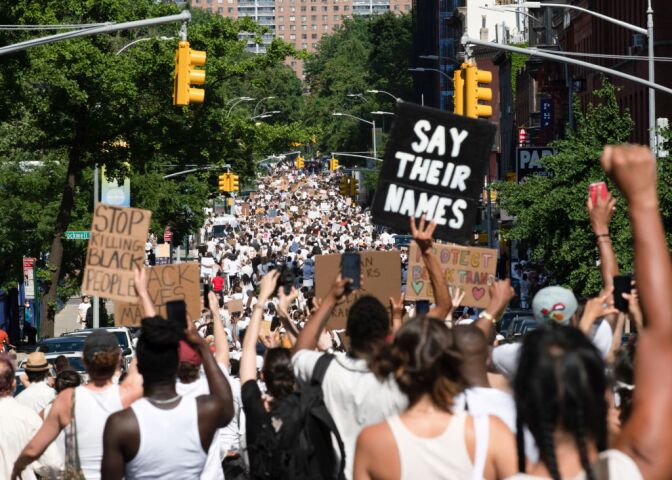Today on AirTalk, we discuss how depression and anxiety rates among Black Americans have increased in the wake of highly publicized police killings. Also on the show, we take a look at current police reform policies; answer your questions about COVID-19; and more.
Taking The Temperature Of SoCal: How Are You Feeling As OC And LA Counties Open Up?
Last week Orange County decided that people didn’t have to put on face coverings in public (though they’re still recommended and required for employees at essential businesses).
Meanwhile, in Los Angeles County, hair salons, gyms and restaurants have been allowed to reopen, albeit with restrictions. Yesterday, the LA Times reported that nearly 1,000 of the 2,000 restaurants inspected by L.A. County public health officials weren’t in compliance with those restrictions.
We check in on the latest from Orange County. Plus, we want to hear from you. If you’ve gotten a haircut, ate out at a restaurant or have engaged with reopening in some way, tell us about your experience by calling 866-893-5722.
Guest:
Alicia Robinson, reporter covering cities and local government for the Orange County Register; she tweets
Black Americans Experiencing Jump In Rates Of Depression, Anxiety After George Floyd Killing
A Census Bureau survey that initially intended to look at the effects of the coronavirus on Americans found that Black and Asian Americans experienced a spike in mental health problems after the killing of George Floyd.
Meanwhile, rates of depression and anxiety remained the same for White Americans, and decreased for Latinx Americans.
The number of Black Americans who exhibited clinically significant symptoms of depression or anxiety went up from 36 to 41 percent during the week when the video of Floyd’s death was released. We dive into why this may have happened and the mental health effects of racism on people of color.
Plus, if you are black and have experienced mental health issues in the wake of George Floyd’s death or the following unrest, call us and share your story via 866-893-5722.
If you or a loved one needs help, call the National Suicide Prevention Lifeline at 1-800-273-8255. Los Angeles County maintains a 24-hour bilingual hotline at 800-854-7771.
You can find POC specific mental health resources here.
Guests:
Erlanger Turner, licensed psychologist and assistant professor of psychology at Pepperdine University; his recent book is “Mental Health among African Americans: Innovations in Research and Practice” (Lexington Book, 2019)
Denise Williams, licensed marriage and family therapist in Los Angeles
Comparing Police Reform Proposals From CA Police Unions, AG Becerra’s Office As Both Announce Broad Agendas
We’re starting to get details on exactly how police reform across California might shape up after the recent release of separate police reform agendas by California Attorney General Xavier Becerra as well as three different police unions representing large cities and police departments.
Over the weekend, the Los Angeles Police Protective League (LAPPL), San Francisco Police Officers Association (SFPOA) and San Jose Police Officers Association (SJPOA) took out a full page ad in a number of newspapers including the Los Angeles Times and Washington Post announcing the reform agenda, which includes creating a national use-of-force standard with a focus on de-escalation and proportional responses to situations, creating a database of officers fired for gross misconduct in an effort to prevent other agencies from hiring them and a publicly-available use-of-force website similar to the one the San Jose Police Department has.
On Monday, AG Becerra announced his own reform agenda, which, like the unions’ proposal, highlights things like training focusing on de-escalation and proportional situational responses as well as making sure officers who commit major infractions are decertified, but also takes other steps to outlaw certain practices like carotid holds and chokeholds as well as “find and bite” techniques used by canine officers. Additionally, it calls for a re-examination of police in addressing issues like mental health crises and homelessness, which they are not specifically trained to handle. The San Francisco Police Department recently announced that trained, unarmed professionals would be responding to noncriminal calls for things like mental health or school discipline instead of patrol officers.
Today on AirTalk, we’ll take a side-by-side look at these national reform agendas as well as reforms proposed by NYU Professor Barry Friedman in a recent Wall Street Journal op-ed that would seek to more fundamentally rethink the idea of police responding to 911 calls, especially noncriminal ones.
Guests:
Lisa Mascaro, chief congressional correspondent in Washington D.C. for the Associated Press; she tweets
Xavier Becerra, California Attorney General; he tweets
Robert Harris, a director of the Los Angeles Police Protective League, the union representing Los Angeles Police Department officers, and an LAPD officer; LAPPL is one of three California police unions that proposed a national reform agenda
Jonathan M. Smith, executive director of the Washington Lawyers’ Committee for Civil Rights and Urban Affairs, former chief of the Special Litigation Section of the Civil Rights Division of the United States Department of Justice (2010-2015) which led the civil investigation of the Ferguson (Missouri) Police Department after the police shooting of Michael Brown in 2014; he tweets
COVID-19 AMA: Reopening And Infection Upticks, A Promising Treatment Option And More
In our continuing series looking at the latest medical research and news on COVID-19, Larry speaks with Sanjeet Dadwal, chief of the Division of Infection Diseases at City of Hope.
The latest in LA County
Officials: CA coronavirus surge tied to increase in testing. When will we know whether reopening has had an impact on infection spikes?
COVID-19 deaths at nursing homes and long-term care facilities top 50K
Dexamethasone as COVID-19 treatment
COVID-19 infections among those with underlying health conditions
How did two infected hair stylists prevent transmission to 140 clients?
Will first COVID-19 vaccines prevent infection?
Cancer patients and COVID infections
Data transparency and COVID-19 clusters
Guest:
Sanjeet Dadwal, chief of the Division of Infectious Diseases at City of Hope




